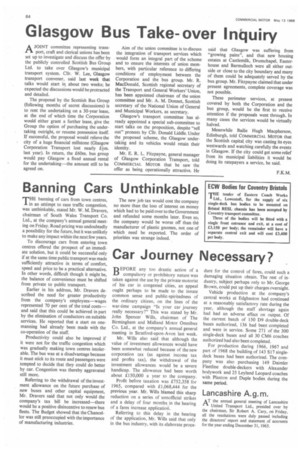Car Journey Necessary?
Page 66

If you've noticed an error in this article please click here to report it so we can fix it.
BEFORE any too drastic action of a compulsory or prohibitory nature was taken against the use by the private motorist of his car in congested cities, an appeal ought perhaps to be made to the innate common sense and public-spiritedness of the ordinary citizen, on the lines of the war-time campaign "Is your car journey really necessary?" This was stated by Mr. John Spencer Wills, chairman of The Birmingham and Midland Motor Omnibus Co. Ltd., at the company's annual general meeting in Stratford-upon-Avon last week.
Mr. Wills also said that although the value of investment allowances would have been somewhat reduced because of the new corporation tax (as against income tax and profits tax), the withdrawal of the investment allowances would be a severe handicap. The allowance had been worth about £150,000 a year to the company.
Profit before taxation was £752,358 for 1965, compared with £1,068,444 for the previous year. Mr. Wills blamed this sharp reduction on a series of unnofficial strikes and a delay of four months in the hearing of a fares increase applicatioti.
Referring to this delay in the hearing of the application, Mr. Wills said that only in the bus industry, with its elaborate proce dure for the control of fares, could such a damaging situation obtain. The rest of industry, subject perhaps only to Mr. George Brown, could put up their charges overnight.
Vehicle production at the company's central works at Edgbaston had continued at a reasonably satisfactory rate during the year, although the staff shortage again had had an adverse effect on output. Of the current batch of 150 D9 double-deck buses authorized, 136 had been completed and were in service. Some 271 of the 300 single-deck buses and all 30 CM6 coaches authorized had also been completed.
For production during 1966, 1967 and part of 1968 the building of 143 Si? singledeck buses had been authorized. The company was also purchasing 149 Daimler Fleetline double-deckers with Alexander bodywork and 25 Leyland Leopard coaches with Plaxton and Duple bodies during the same period.
Lancashire A.g.m.
AT the annual general meeting of Lancashire United Transport Ltd., presided over by the chairman, Sir Robert A. Cary, on Friday, all the resolutions were duly passed including the directors' report and statement of accounts for the year ending December 31, 1965.




















































































































































